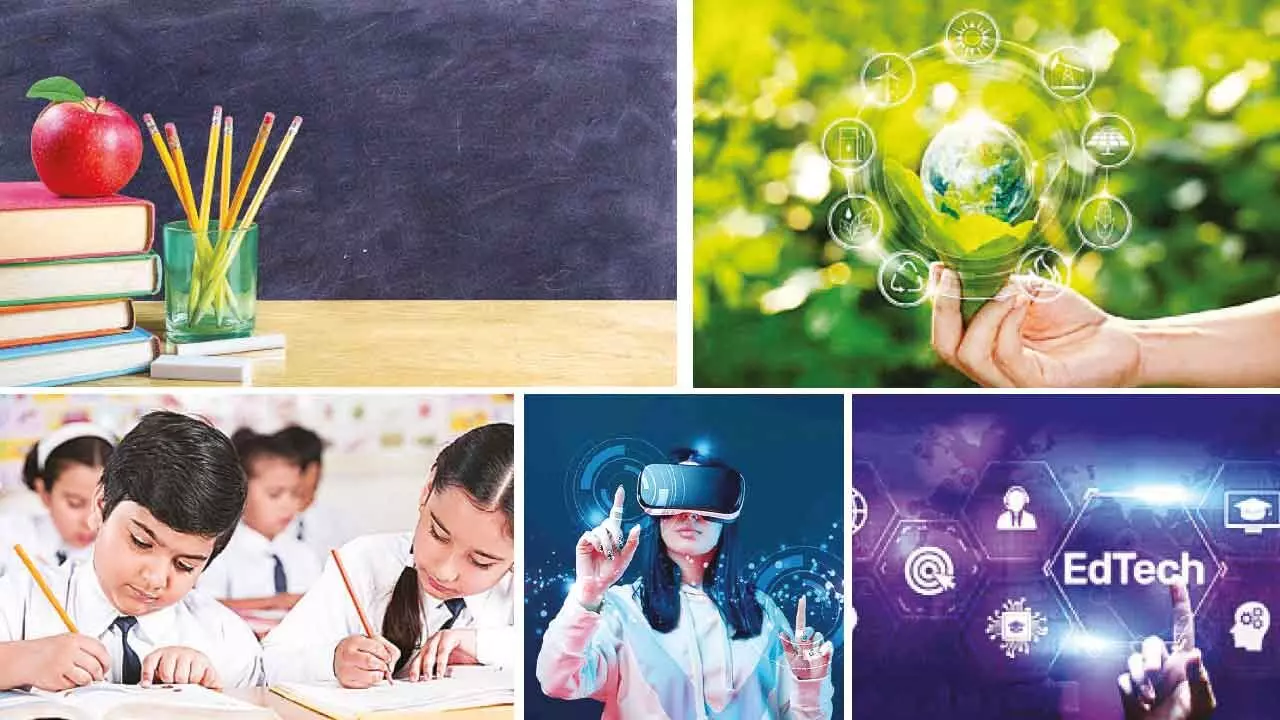Education outlook 2024: Trends to look out

Young Hans spoke with education experts about how things were in education and skilling towards the end of 2023. The experts looked at different aspects of learning and gave a detailed overview of the changes, like new technologies and creative methods, which were happening in education at the end of 2023. They did not just focus on the past; they also looked ahead to 2024, predicting positive developments. Also discussed how learning new skills could shape a workforce for the future.
The role of AI in teacher training and students’ perspective
The year 2023 has witnessed an explosive change in the education and skill training ecosystem in the form of increased usage of AI, which is everywhere and has grown into an essential skill that our classrooms, school systems, and university systems need to respond to.
A few steps have been taken in the right direction. CBSE has already introduced AI as a subject for grades 9-12 and as a skill subject for grades 6–8. These are great systemic changes; however, the desired outcomes and scale cannot be achieved unless we integrate AI into our classrooms and upskill teachers.
In the space of education and skilling, Generative AI is going to empower us to strengthen our future economy and be revolutionary in its ability to provide a robust system of support for teachers and youths. The Way Forward is the need to look at AI in two different ways: first, how can AI make education better (AI for Education), and second, we need to look at how AI can be taught at scale and more inclusively in classrooms (AI in Education). Leveraging AI, India has this unique opportunity to become from a back office of the world to the front office of the world developing products and services for the rest of the world to consume.
The aim in 2024 must be to ensure that teachers, students, and children in rural areas have equal access to technology as in metro cities. By integrating new technologies from the ground up, we can avoid the need to catch up later and instead adopt a more grassroots approach. In the current era of AI and digital advancements, we can take a bottom-up approach, aiming to empower individuals facing challenges by providing them with the benefits of technology. Let’s use this wave as an opportunity to completely change and re-work our education system where AI can be used as an education equalizer.
- Manav Subodh- Founder and MD of One Million for Billion)
Shape up the future of Indian primary education
Primary education in India is going through a transformational phase. This phase and especially the developments of 2023 in regards to changed policy implementation would be considered instrumental in shaping up the future of Indian primary education. The coming year, 2024 is expected to witness a shift with the Indian primary education system becoming more in sync with the global education scenario. These changes are extremely important for the benefit of students who will not be limited to education opportunities in India but be prepared for global education opportunities. Also, Integration of AI and other futuristic technologies will help NEP’s execution at both public and private level in the K12 Education Segment.
- Naman Jain, Director, Silverline Prestige School, Ghaziabad
Scope of green skills & sustainability, green jobs
In 2023, the world saw a surge in green skills and jobs, driven by a collective realisation of our responsibility towards our planet. The green economy became more than a trend; it became a necessity. At the recently concluded COP28, global leaders recognized the important role that green skills and jobs will play in addressing the global climate crisis. The Green Jobs for Youth Pact, a collaborative effort launched by the International Labour Organization (ILO), United Nations Environment Programme (UNEP), and United Nations Children’s Fund (UNICEF), is putting young people front and center of the green transformation.
According to ILO, the transition to a green economy could generate 25 million green jobs by 2030. As we move into 2024, the expectations are high for more green jobs, fueled by advancements in renewable energy, sustainable agriculture, and eco-friendly technologies and commitment from global leaders. The green economy is expected to not only contribute to environmental sustainability but also to economic resilience. Embracing green skills isn’t just a trend, it’s a pivotal moment for humanity, and it’s an essential step towards a sustainable future, where every job has the potential to contribute to a healthier, more resilient planet.
-Saffin Mathew- Program Director- Youth, 1M1B
Ed-tech trends
2024 is going to be a very different year for a lot of industries, including Edtech. Edtech in particular, has seen a huge uptake in 2020, which will continue to grow till 2022. 2023 was a different story, with students going back to offline options.
In 2024, Edtech will be in an experimental phase. No one can say what will work at this point in time. The online world is here to stay, and so is the physical world. The Covid story that everything will move online has turned into a myth. Innovation in the space is required; which innovation will make sense to the masses will be the biggest question to all the tech companies.
- Anthony Fernandes, Founder and Director of Shaalaa.com








